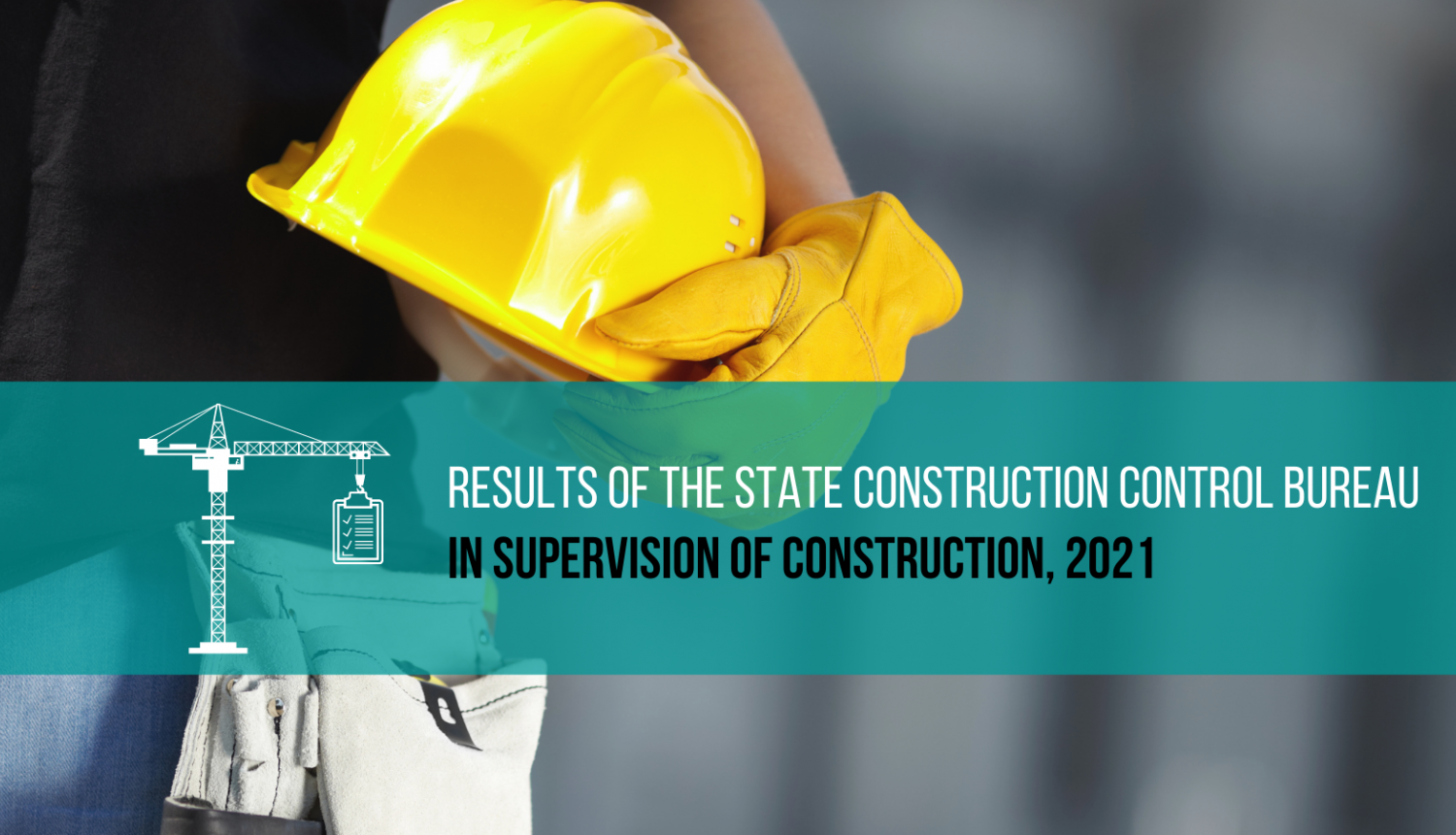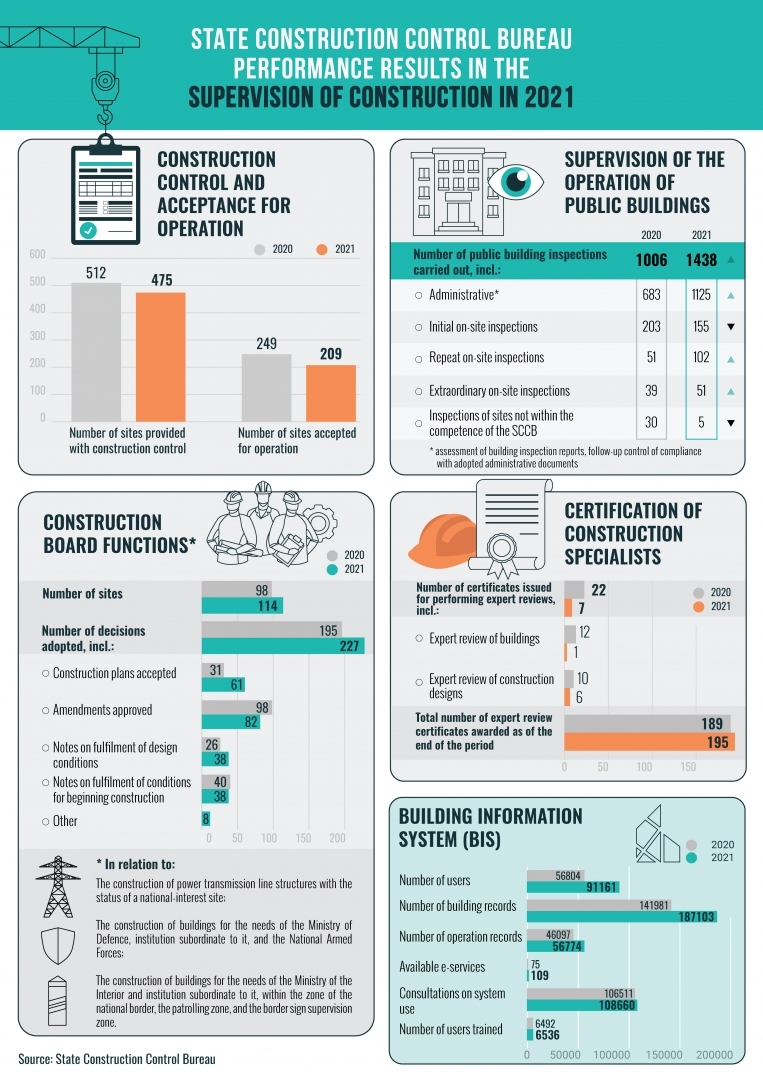2021 was important for the State Construction Control Bureau (SCCB), as the year brought changes in the bureau’s duties pertaining to the supervision of construction, as well as significant development for the Building Information System (BIS). The bureau also gained a new function, acting as a construction board for the building of structures in the national border, patrolling and border sign supervision zones for the Ministry of the Interior. It was entrusted with the supervision of the structural stability documentation of Class A hydro plants, namely the Ķegums, Pļaviņas and Riga HP.
- Control of Construction
The scope of sites that are subject to monitoring by SCCB was updated in 2021, and the bureau no longer supervises any construction initiated by municipal governments with a contract price of more than EUR 1.5 million, instead supervising the construction of all Group III public buildings, if a building permit is necessary for the construction.
A strategic decision was made to transition from traditional site inspection to systemic inspections, with the construction control based on process and risk analysis. In 2021, SCCB published guidelines for a building contractor quality control system, to provide businesses with support in meeting requirements. The purpose of the guidelines is to ensure that the quality of construction complies with the values indicated in Latvian construction and other standards, laws, regulations, and building contracts. The guidelines contain the most critical requirements and processes that building contractors must include in their quality control systems.
In conjunction with the industry, SCCB also developed construction supervision service guidelines to provide support to parties that initiate construction, and enable them to protect their rights and interests, and to prevent unauthorised deviations from construction designs by building contractors, violations of laws and regulations, and deviations from technologies specified in construction designs and work execution plans. These guidelines have been published on the website of SCCB.
Last year the bureau provided construction control at 475 sites. In 2021, as part of the ongoing ‘Consult First’ initiative, SCCB arranged 24 information meetings with 874 people involved in construction processes. The bureau also organised three upskilling events covering the requirements and recommendations for construction control. Other supervisory bodies and businesses operating in the industry joined these events, attended by 870 people in total. Two meetings with representatives of Latvian construction boards took place, bringing together more than 100 participants each.
- Construction Board Functions
In performing its functions as a construction board, SCCB adopted 227 decisions, most of which (214) concern the construction of buildings for the needs of the Ministry of Defence, institutions subordinate to it, and the National Armed Forces. The construction board handled 114 construction cases during the reporting period.
Since 3 September 2021, SCCB has also functioned as the construction board for the construction of buildings for the needs of the Ministry of the Interior and institutions subordinate to it, within the zone of the national border, the patrolling zone, and the border sign supervision zone.
- Supervision of Operation
Changes have also concerned the operation of the buildings under the supervision of the bureau. Previously, these buildings had been identified based on the quantity of people for which it was intended. This criterion was eliminated as ambiguous, and it was determined that SCCB would supervise Group III public buildings with a total floor area of at least 1000 m2. Also, since October 2021, BVKB has been supervising the structural stability documentation of Class A hydro plants, namely the Ķegums, Pļaviņas and Riga HP.
In total, SCCB supervises some 8000 public buildings that are currently in operation, of which only 1496, or 19%, have undergone a technical inspection. The previous deadline for conducting the regular technical inspection expired for most buildings in October 2019, and the government decided to extend it to 31 October 2024 for Group II and III buildings.
313 on-site inspections took place as part of the supervision of the use of public buildings in 2021. 17% of the buildings were found to be in emergency or pre-emergency condition, meaning that operating them prior to eliminating the hazard was prohibited. 18% of the buildings were in excellent or good condition, while 66% required stability improvements. In 2021, the bureau also conducted two information webinars to help parties involved in construction understand the duties of building owners, and what specialists need to be hired to comply with regulatory requirements. The webinars gathered a total of 206 participants.
- Certification of Construction Specialists
In 2021, BVKB received 8 applications for a construction expert review certificate, and 2 applications for a temporary permit to provide construction design expert review services. As usual, there were more applications in the field of construction design reviews, rather than in the building expert review field.
Similarly to the other fields it supervises, in 2021, the bureau organised an upskilling event for construction experts, or construction specialists who intend to become construction experts. 114 people participated in the event.
The inclusion of construction experts in the list of regulated professions is a new item important for the industry that was introduced this year.
- Building Information System
The number of BIS users has been rapidly approaching 100 thousand, with a 60% increase within one year. Most of them (85.9 thousand) are users of the public portal.
2021 saw significant efforts to improve the system, with updates in the construction log and the introduction of new e-services. For example, clients have been able to order the cadastral measurement of a building or a group of rooms as part of a construction process since August 2021. Extensive features were implemented in managing the lifecycle of buildings, and in what pertains to keeping records of construction waste, throughout the process of construction.
The speed of BIS operation and the availability of BIS support by phone were successfully improved. In 2021, the BIS support service was provided with access to client records, for quicker responses to applications. The waiting time for applications submitted online halved, from two days in 2020, to just one business day in 2021.
A survey of 1900 BIS users revealed their assessment of the e-services available through the system: in 2021, it was 3.83 out of 5, an increase from last year’s 3.71.




